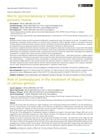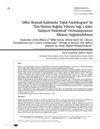 October 2023 in “International journal of biology, pharmacy and allied sciences”
October 2023 in “International journal of biology, pharmacy and allied sciences” Personalized treatment plans combining natural and synthetic approaches are important for managing alopecia effectively.

Non-invasive methods can effectively diagnose and manage alopecia areata.
 September 2021 in “Медицинский совет”
September 2021 in “Медицинский совет” Proteoglycans, especially in Nourkrin®, can effectively and safely treat hair loss.
 April 2021 in “Sohag Medical Journal”
April 2021 in “Sohag Medical Journal” Alopecia areata is an autoimmune condition causing hair loss, linked to genetic factors and immune system issues, with no cure yet.
 January 2020 in “Der Pharmacia Lettre”
January 2020 in “Der Pharmacia Lettre” Nanoparticle-based herbal remedies could be promising for treating hair loss with fewer side effects and lower cost, but more research is needed.
 January 2020 in “Elsevier eBooks”
January 2020 in “Elsevier eBooks” Plant-based chemicals may help hair growth and prevent hair loss but need more research to compete with current treatments.
 January 2007 in “Elsevier eBooks”
January 2007 in “Elsevier eBooks” Alopecia areata is a reversible, autoimmune-related hair loss that can have significant emotional impact and uncertain treatment effectiveness.
 40 citations,
July 2015 in “Journal of Cellular Biochemistry”
40 citations,
July 2015 in “Journal of Cellular Biochemistry” Cysteine helps maintain keratin production in skin cells even when iron is low.
 28 citations,
March 2017 in “Scientific Reports”
28 citations,
March 2017 in “Scientific Reports” Minoxidil may protect nerves and improve hair quality during paclitaxel treatment.
 October 2022 in “International journal of research and review”
October 2022 in “International journal of research and review” A man had severe stomach issues after a dental treatment with Formacresol, which improved with a different medication.
 August 2023 in “Malaysian Journal of Medicine and Health Sciences/Malaysian journal of medicine and health sciences”
August 2023 in “Malaysian Journal of Medicine and Health Sciences/Malaysian journal of medicine and health sciences” Pueraria mirifica extract may help treat benign prostatic hyperplasia.
 7 citations,
July 2020 in “Pigment cell & melanoma research”
7 citations,
July 2020 in “Pigment cell & melanoma research” RT1640 treatment reverses gray hair and promotes hair growth in mice.
 489 citations,
November 2021 in “Signal Transduction and Targeted Therapy”
489 citations,
November 2021 in “Signal Transduction and Targeted Therapy” The JAK/STAT pathway is important in cell processes and disease, and JAK inhibitors are promising for treating related conditions.
 31 citations,
August 2021 in “Stem Cell Research & Therapy”
31 citations,
August 2021 in “Stem Cell Research & Therapy” The conclusion is that understanding how hair follicle stem cells live or die is important for maintaining healthy tissue and repairing injuries, and could help treat hair loss, but there are still challenges to overcome.
 August 2024 in “Drug Design Development and Therapy”
August 2024 in “Drug Design Development and Therapy” Decursin shows promise for treating cancer, neuroprotection, inflammation, and hair loss.
 236 citations,
July 2001 in “Trends in Molecular Medicine”
236 citations,
July 2001 in “Trends in Molecular Medicine” Future hair loss treatments should aim to extend hair growth, reactivate resting follicles, reverse shrinkage, and possibly create new follicles, with gene therapy showing promise.
 April 2012 in “Informa Healthcare eBooks”
April 2012 in “Informa Healthcare eBooks” Classifying hair diseases, like alopecia, is difficult and needs more research to understand their causes.
 42 citations,
March 2006 in “Drug Discovery Today: Therapeutic Strategies”
42 citations,
March 2006 in “Drug Discovery Today: Therapeutic Strategies” The conclusion is that we need more effective hair loss treatments than the current ones, and these could include new drugs, gene and stem cell therapy, hormones, and scalp cooling, but they all need thorough safety testing.

Millet extract, wheat germ oil, L-cystine, and calcium pantothenate reduced hair loss and improved hair growth in women with diffuse alopecia.
 3 citations,
July 2012 in “British journal of hospital medicine”
3 citations,
July 2012 in “British journal of hospital medicine” The guide helps clinicians diagnose and manage hair loss, detailing examination techniques and treatments for different types of alopecia.
 29 citations,
September 2012 in “Dermatologic Clinics”
29 citations,
September 2012 in “Dermatologic Clinics” Hair disorders are caused by a complex mix of biology, genetics, hormones, and environmental factors, affecting hair growth and leading to conditions like alopecia.
 16 citations,
June 2021 in “Journal of Dermatological Treatment”
16 citations,
June 2021 in “Journal of Dermatological Treatment” Minoxidil effectively treats hair loss, especially androgenetic alopecia, but needs more research for better understanding.
 16 citations,
September 2018 in “Journal of Molecular Liquids”
16 citations,
September 2018 in “Journal of Molecular Liquids” The PS-b-PAA copolymer nanomicelles are effective for delivering a cancer treatment drug in photodynamic therapy.
 July 2024 in “Clinical Cosmetic and Investigational Dermatology”
July 2024 in “Clinical Cosmetic and Investigational Dermatology” Non-drug therapies show promise for hair regrowth but need more research.
 2 citations,
January 2019 in “Elsevier eBooks”
2 citations,
January 2019 in “Elsevier eBooks” Biotin supplements are unnecessary for most people but may help with certain conditions like biotin deficiency, brittle nails, and some hair loss.
48 citations,
August 2010 in “PubMed” Chemotherapy often causes hair loss, which is distressing for many, but usually reversible.
11 citations,
October 2021 in “Journal of The European Academy of Dermatology and Venereology” Topical finasteride is an effective and safer treatment for male hair loss.
 January 2019 in “Elsevier eBooks”
January 2019 in “Elsevier eBooks” Different hair disorders have specific treatments and outcomes, with some resolving on their own and others requiring medication or emotional support.
 3 citations,
April 2021 in “Biomolecules & Therapeutics”
3 citations,
April 2021 in “Biomolecules & Therapeutics” The protein ER71/ETV2 helps regrow hair after chemotherapy by improving the growth of new blood vessels.
 1 citations,
January 2022 in “Updates in clinical dermatology”
1 citations,
January 2022 in “Updates in clinical dermatology” Some drugs can cause changes to your hair.




























